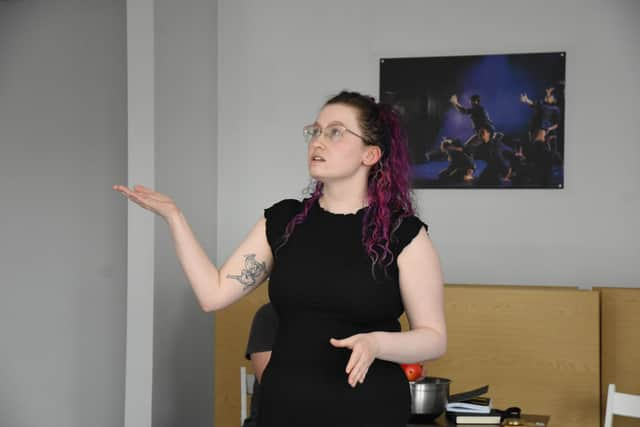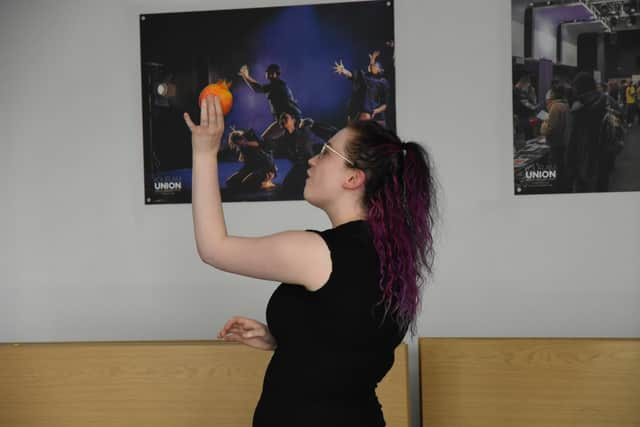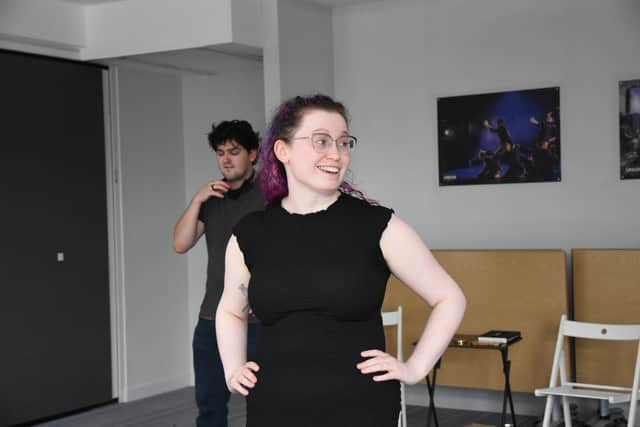Bishopbriggs actor to star in breakthrough role in Fringe play on Iranian diaspora and identity
and live on Freeview channel 276
A Bishoppbriggs actor is set to star in a brand-new Fringe play on Iranian diaspora and identity.
Ellie McKay, a recent graduate of Art History from the University of St Andrews, is a promising young actor set to star in the new play ‘Lost in Translation’ at the Fringe this year.
Advertisement
Hide AdAdvertisement
Hide AdHer performance will be the second at the Edinburgh International Arts Festival, after starring in a play at the Fringe put on by St. Andrews last year in 2022.
Written by University of St Andrews graduate Nahan Nikbakhsh, Lost in Translation is the only play at the Fringe this year sponsored by the ancient University - as academics deemed it worthy of a 13 day run at the Fringe.
Calling the characters in Lost in Translation likeable would be a stretch - in fact the cast and crew are very open about the fact that the characters are ‘unabashedly pompous’.
A three-man play, the work is somewhat absurdist, and very much open to interpretation.Lost in Translation is about as cerebral as they come, taking place entirely within the head of the protagonist, and interactions he has with the characters - called A, B and C - representative of his own thoughts and feelings on himself.
Advertisement
Hide AdAdvertisement
Hide AdEllie McKay plays the role of B, a contrarian voice in the protagonist’s head, doubting his own identity and challenging his preconceived notions of self.


Ellie Mckay spoke of her own experiences and what made her take the role in the play:”I had been involved initially in the production side of it, and I really enjoyed the writing of course.
“It’s so different from most student-written theatre - I’ve not seen anything else like it at St. Andrews, not just in writing but in content and what it’s speaking to.
“I think a lot of people will be able to relate to it. In Scotland and Glasgow in particular it’s a very multicultural city, particularly for us as well, we are one of the first generations in Glasgow growing up in a city that’s so diverse.”
Advertisement
Hide AdAdvertisement
Hide AdDespite being inspired by the author’s experience as a second-generation Iranian immigrant to the UK - play-goers will be able to relate their own experiences and leave the venue with a different point of view.
We got a chance to chat with producer Felix Daglish, writer Mahan Nikbakhsh, and local actor Ellie McKay ahead of their first run of the play at the Fringe today, Friday August 4.
Director Mahan spoke about Lost in Translation, he said:“The play’s very cryptic, and there’s something in it for everyone - it’s a play about being an outsider. It’s about exile, and not being able to fully inhabit the sense of self.
“At all points the play is asking: ‘who are you?’ That’s basically what every scene is about in essence. It’s really weird, when you first sit down, it’s not going to be like a normal theatre experience, it all comes together in the end, but in the start it’ll be confusing.
Advertisement
Hide AdAdvertisement
Hide Ad“The casting pool was made entirely of matriculated St Andrews students,which of course puts a social constraint on the type of actors we could use.
“What I have focused on is accents, the lead is American, Ellie is Glaswegian, and C is English.
“Those accents have different power dynamics associated with them of course.
“Ellie’s character is a very good character to focus on, she plays the ‘shadow voice’, it’s a voice in one’s subconscious that everyone has.”
Advertisement
Hide AdAdvertisement
Hide Ad

Ellie continued:”It’s almost like my character is giving a voice to the protagonist’s intrusive thoughts, all of the negative things that he thinks about himself are voiced through that character.
“On accents in the play, the Scottish accent that we have there is a discussion, particularly now, that people have to change their accent to fit in or get a job, particularly if you come from a working class background.
“Especially in a place like St. Andrews, where my accent is very rare, fits into the theme of ‘do I change to fit in?’
“The play is all about being yourself, so it would feel disingenuous to any other accent.
Advertisement
Hide AdAdvertisement
Hide Ad“My character is trying to get the protagonist to face up to facts he doesn’t want to - the Scottish accent, particularly the west coast accent, is particularly guttural and intimidating, which tracks with the confrontational nature of B.
“The contrast between American, English, and Scottish accents - even if you couldn’t see the play and just hear it, it should give the same message we’re trying to convey.”
Mahan took inspiration for the play from the Iranian modernist writer, Sadeq Hedayat, although also admits to finding the writing on diaspora by great Irish writers such as Yeats and Beckett.
The initial script for the film was written for the most part in Northern Ireland, and was greatly inspired by the Irish play ‘The Playboy of the Western World’ - particularly in the use of the father figure in the narrative.
Advertisement
Hide AdAdvertisement
Hide AdThe concept of the father is central to Lost in Translation, particularly the generational passing of identity - although the idea of the father will of course, like the rest of the play, be very open to interpretation on a person-by-person basis.


Speaking on how open to interpretation Lost in Translation is, producer Felix Daglish said:“This play has the potential to really make an impact, it shows a flawed human being in an authentic light, in a world that’s so perfectionist with the onset of social media and other things, having that narrative is really important.
“If you’re writing specifically for Iranians or Glaswegians, that play will hit its target market, but where’s the universal appeal? I think Lost in Translation managed to do both.
“I wanted to get involved in that vision,I felt pulled in by the play on a personal aspect and wanted to contribute to that when I first saw it.
Advertisement
Hide AdAdvertisement
Hide Ad“I’ve always been more introspective than most, I was born disabled and that makes you mature quicker, having to confront hardship at quite a young age.
“People feel very uncomfortable around that, and I had to buttress the more difficult aspects of disability from people around me a lot as a teenager.
“That’s a lot of what you see in the play, he buttresses his Iranian-ness andthe difficulties with his heritage because it is just easier,
“The play’s a question about assimilation, and about what you lose to assimilation and whether you should do it. I definitely felt that, everyone feels that, it doesn’t matter if you’re disabled or any other kind of minority.
Advertisement
Hide AdAdvertisement
Hide Ad“Everyone is torn between group-think and individualism, and I think that’s what’s so attractive about the play.”
Lost in Translation will see a 13 day run at the Fringe in ‘Sprout Studio’ - a new intimate stage at the Greenside venue on Infirmary Street.
You can catch the play at 13.50 every day from today,Friday August 4, to Saturday August 12 - and then again from Monday August 14 to Saturday August 19.
Comment Guidelines
National World encourages reader discussion on our stories. User feedback, insights and back-and-forth exchanges add a rich layer of context to reporting. Please review our Community Guidelines before commenting.
